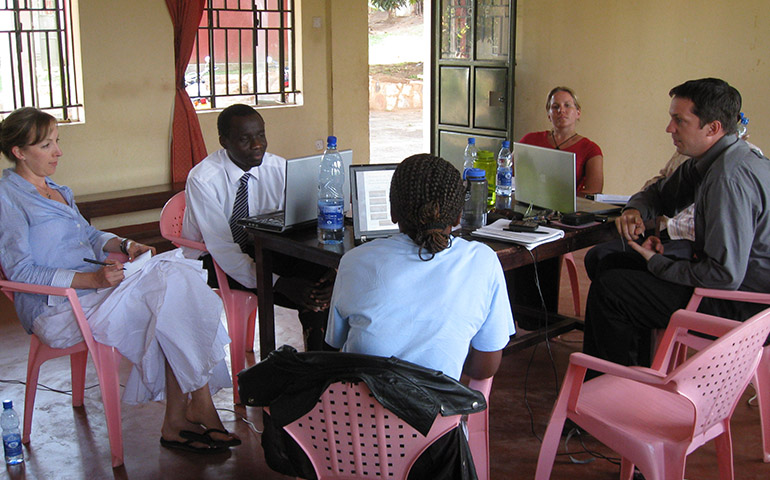I’m Anjali Sastry, from Mumbai, the US, and points in between. I first got to MIT 30 years ago(!). I teach system dynamics and run the GlobalHealth Lab at the Sloan School of Management.
Here you see some of my Lab students with Reuben Mubiru and colleagues in Kyetume, Uganda. Our team studied their clinic, the setting, and their challenges; planned an improvement effort with the staff; worked on-site for several weeks; and followed up. This project developed a new strategy and improved management systems.
A year or so later, thanks to our collaboration, Kyetume was serving more patients, dispensed more and better medication, got its first ambulance, and had improved service quality and operational efficiency.
It’s one of almost 50 projects we’ve done in Africa and India. Each project has been designed for our students’ education, of course, but each also aims to benefit the enterprise and community. And it’s worked. I know this because we’ve been studying the effects that follow each project.
I have three big ideas for a vision to multiply this impact.
The first idea takes on the gap between what we know and what we do.
Medical science has the know-how to improve lives. But we fall short in the delivery, when information and treatments don’t get where they are needed.
Calling it an implementation gap maybe doesn’t do justice—it’s easy to downplay, to stick the word “just” in front of implementation. Yet engineering is not “just” the implementation of science but a (vast) field in its own right. Some call for a new practical science to tackle the unique complexities of enabling prevention and delivering medical care more effectively.
For this new effort, we need innovation in operations, business models, strategy, stakeholder management—things that social scientists study. If every project could advance, in some way, our knowledge of implementation, we’d aid our broader quest for better organizations, better institutions, and better policies.
Innovations in how we design learning experiences enable students to contribute to this body of knowledge. In fact, the way I see it, whenever we take on the challenge of making something work in the world, we need everyone—not just faculty and researchers, but students, staff, and alumni, along with the communities, organizations, and other stakeholders we collaborate with—to join the shared effort of learning from implementation.
My second idea is about iteration.
The real world involves the complexities of context and human nature, along with unintended consequences and tipping points that are not apparent until they are reached—things that work against analytical tractability.
As a result, even the finest professors [an inside joke at MIT] cannot “crack” complex real-world challenges in a single shot but must iterate. We need to test existing assumptions along with creative new ideas. Of course, engineers know all about iteration; health care delivery has much to learn from areas like product and software development.
If iteration enables each project to succeed (and we certainly iterated with Kyetume), it’s also needed across efforts. So we face a new need: to report on and derive conclusions from each effort, then connect to others. How do we gather the right data, and appropriately document actions and results, to collectively learn from everything we try, even if the efforts are in different places with different people at different times?
If you think about it, most efforts to solve complex problems are partially successful and partially flawed. We can’t afford to miss the chance to extract everything we can from every experience, to benefit both practice and academia. New tools for sharing will help, not only with the practical stuff of tools and approaches, but also with building the knowledge base for better explanations, frameworks, and theories that account for differences across settings.
This gets to the third idea: appreciating what does work.
Some of our GlobalHealth Lab collaborators have attained quality, cost, scale, or sustainability anyone would envy. We aim to analyze how their capabilities, knowledge, and practices enable good performance, then share what we learn from them and enable their next steps that leverage what works with them.
Kyetume hadn’t yet attained such status in its operations or finances, and there was much we could do there. There was also much we learned. Our collaborators had deep knowledge of the everyday choices facing the people they served. (Understanding how patients make decisions, it turns out, is crucial in healthcare delivery.) We drew on their frontline workers’ expertise and paired it with our MIT toolkit to come up with new solutions. The experience underscored core themes in my project-based teaching that I believe also benefit field-based research: to be humble; to listen and observe carefully; to ground every decision in data; and to relentlessly seek improvement.
As a researcher, I’ve used simulation and retrospective study to explore organizations. But this kind of work offers novel insights: New ideas about quality, scale, and sustainability in healthcare flow from collaborating on problem-solving. It turns out that trying to change something can really help you understand it.
Our founder called for “earnest cooperation” between MIT and the world. And this is my vision: with implementation, iteration, and appreciation our watchwords, we will creatively, rigorously, even earnestly, collaborate.
Together with front-line organizations, MIT colleagues, and some of the best students in the world, we will tackle really big problems in smart new ways.

